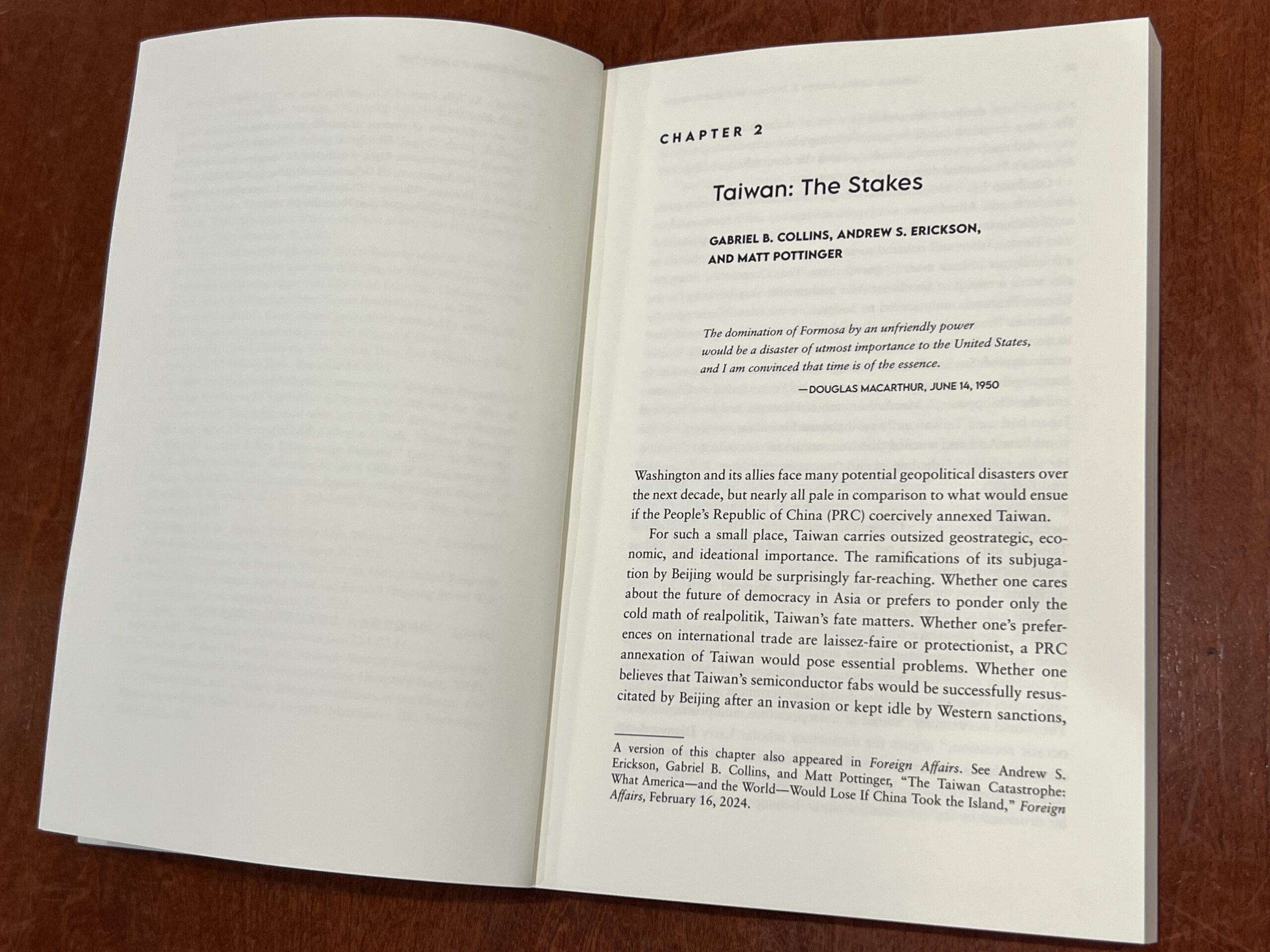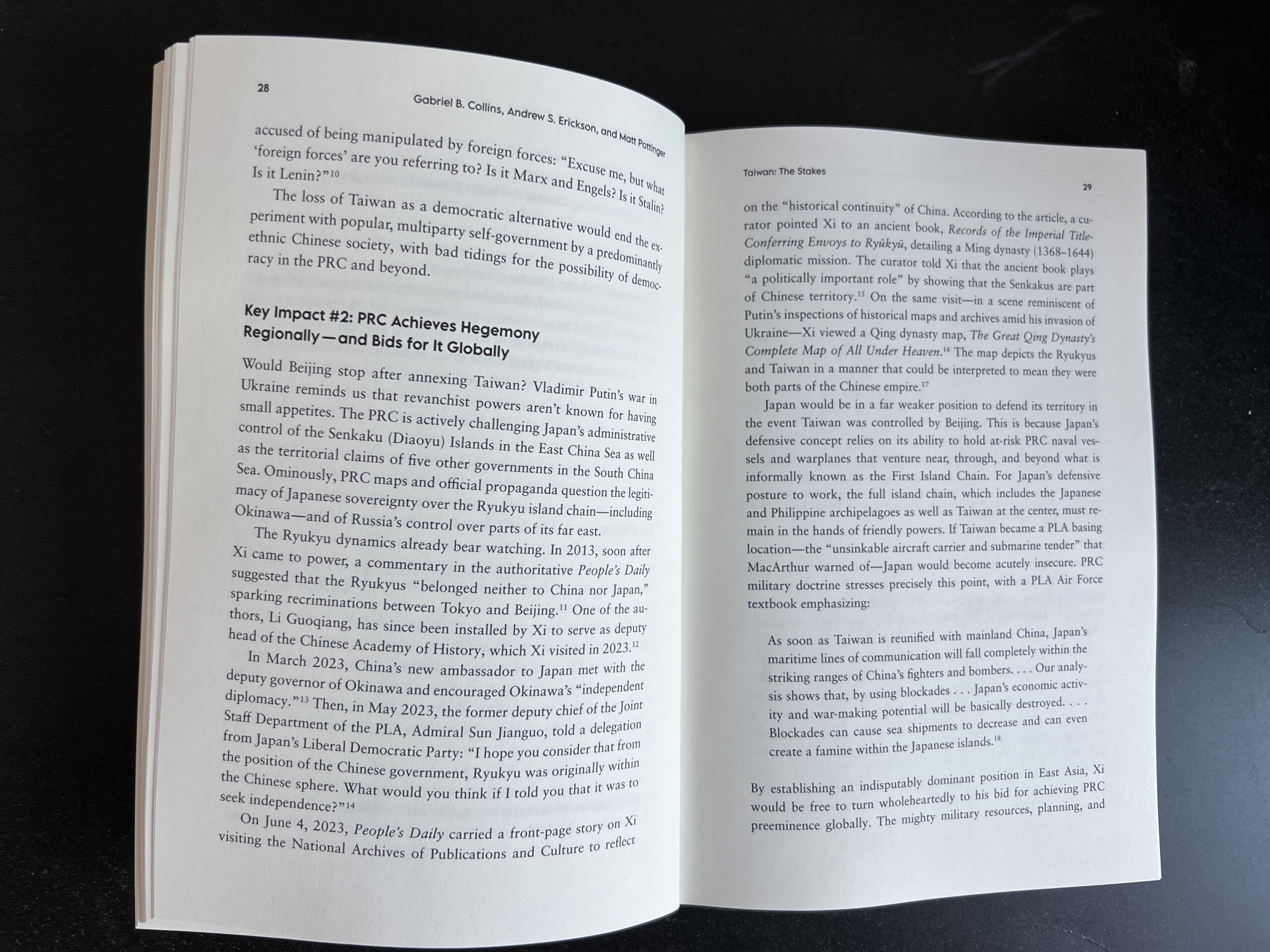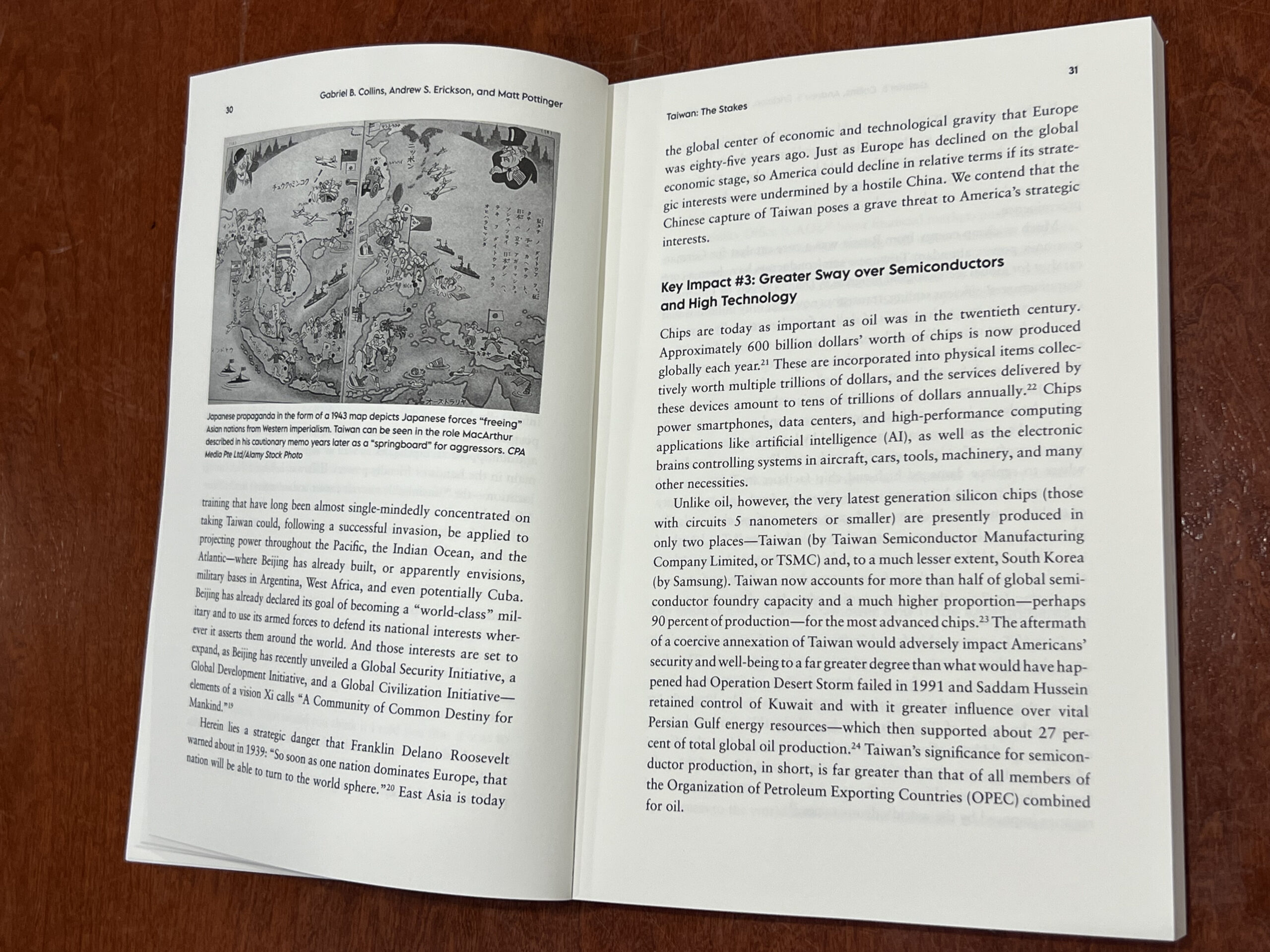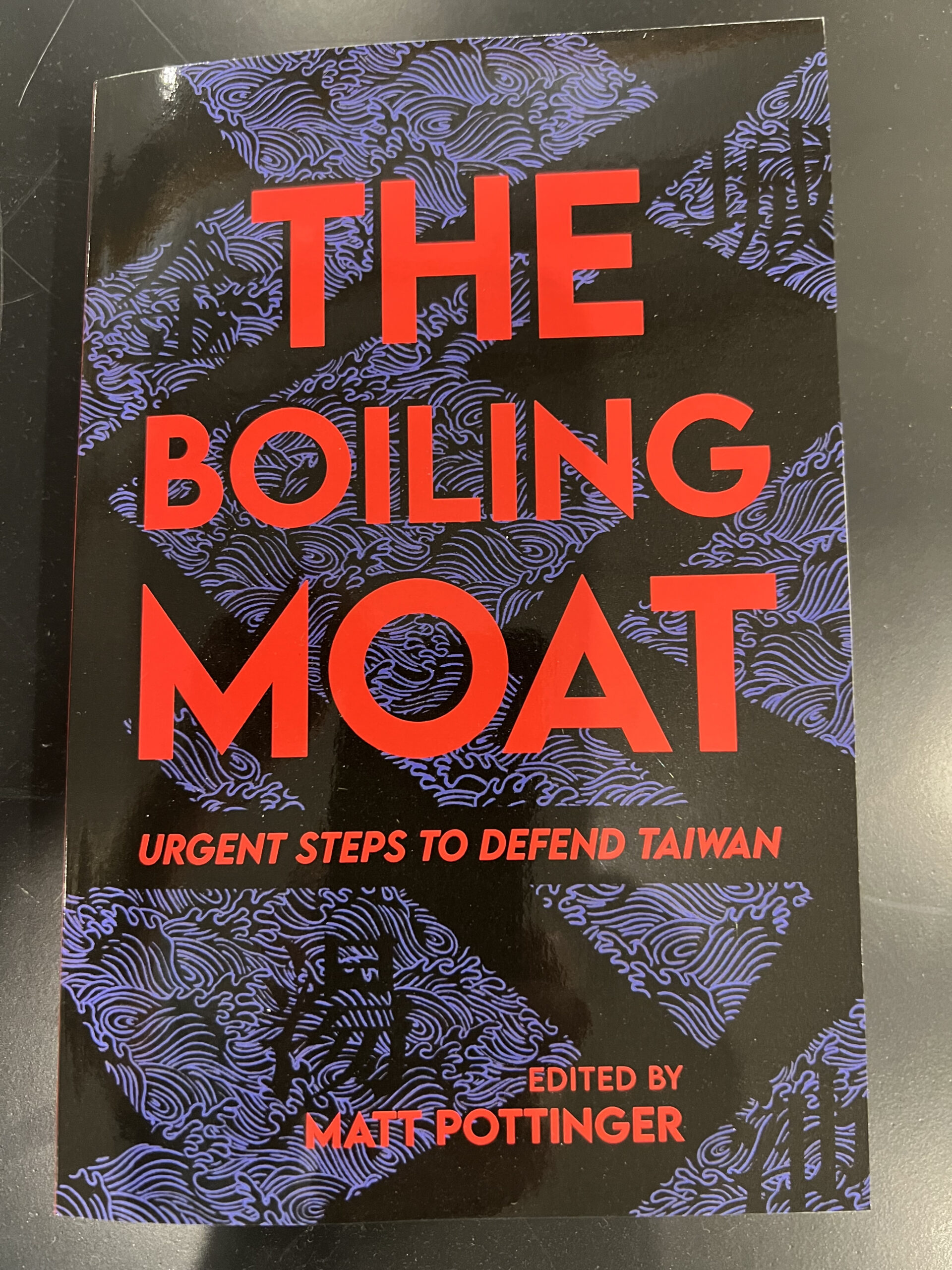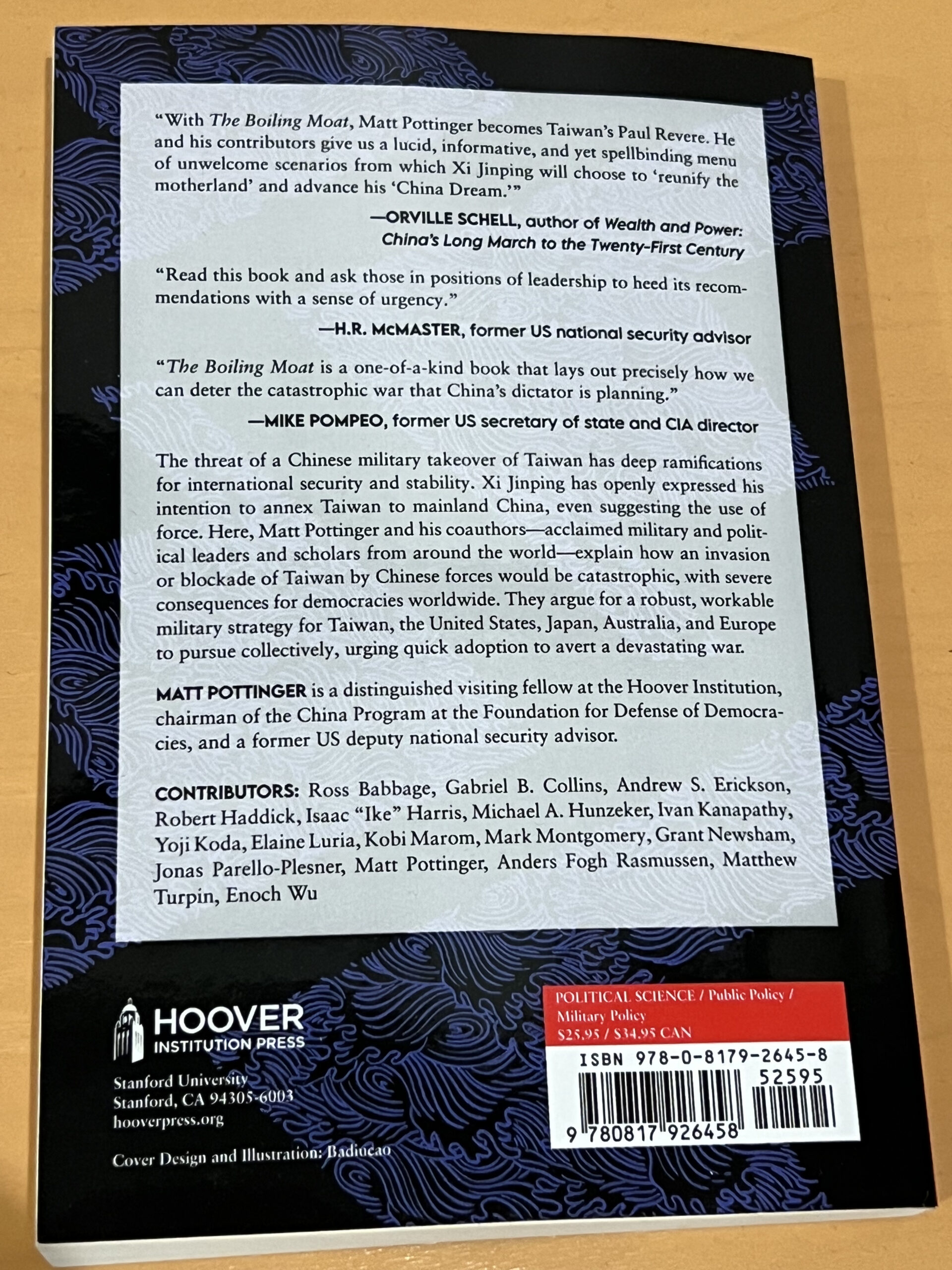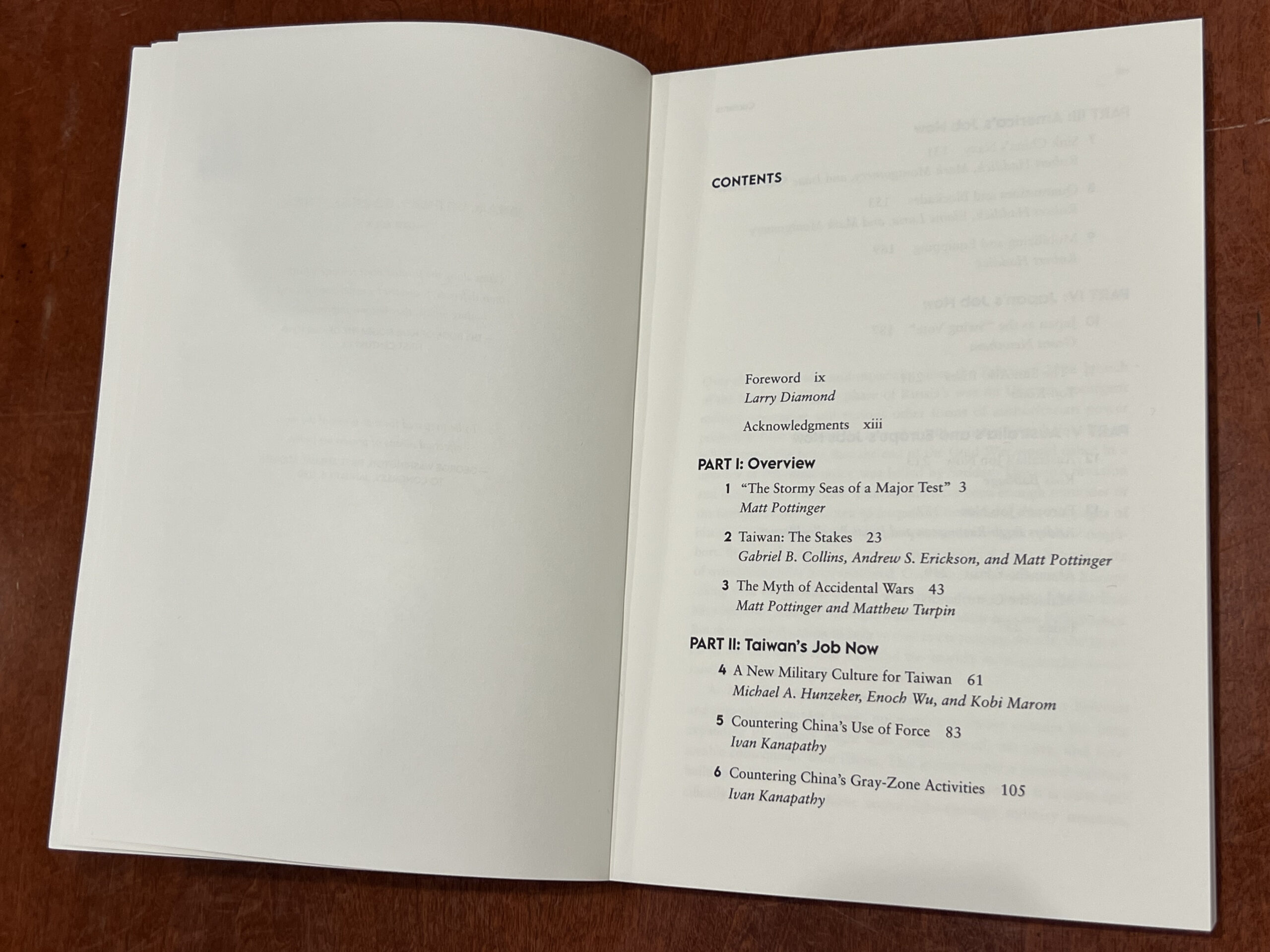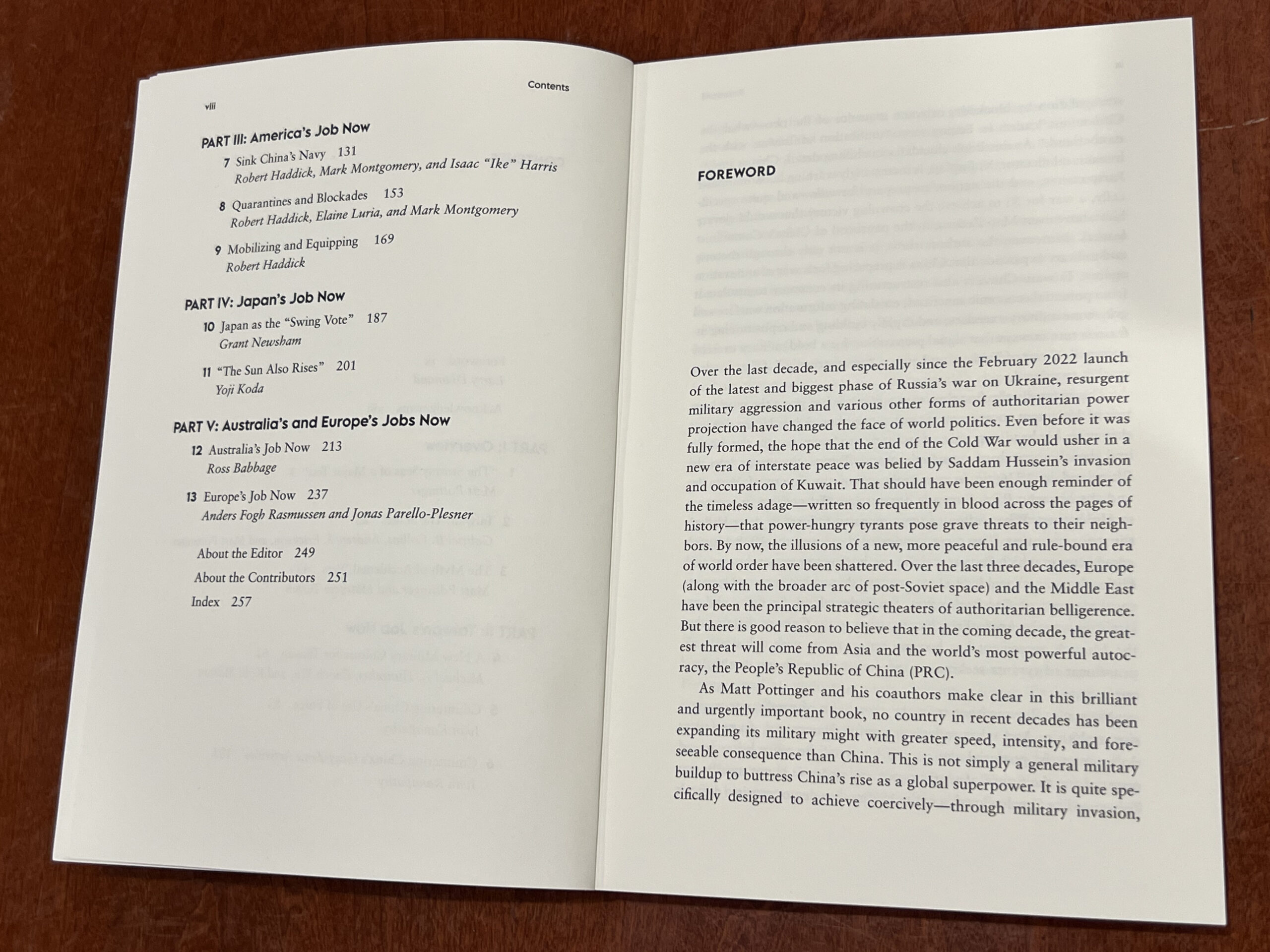Taiwan: The Stakes
Honored to contribute Chapter 2 with Gabe Collins and Matt Pottinger to Matt’s timely, impactful edited volume!
Gabriel B. Collins, Andrew S. Erickson, and Matt Pottinger, “Taiwan: The Stakes,” in Matt Pottinger, ed., The Boiling Moat: Urgent Steps to Defend Taiwan (Stanford, CA: Stanford University Hoover Institution Press, 2024), 23–42.
- CLICK HERE TO DOWNLOAD THE EBOOK COLOR VERSION.
- READ A SCAN FROM THE PRINTED BOOK HERE.
The domination of Formosa by an unfriendly power would be a disaster of utmost importance to the United States, and I am convinced that time is of the essence.
— DOUGLAS MACARTHUR, JUNE 14, 1950
Washington and its allies face many potential geopolitical disasters over the next decade, but nearly all pale in comparison to what would ensue if the People’s Republic of China (PRC) coercively annexed Taiwan.
For such a small place, Taiwan carries outsized geostrategic, economic, and ideational importance. The ramifications of its subjugation by Beijing would be surprisingly far-reaching. Whether one cares about the future of democracy in Asia or prefers to ponder only the cold math of realpolitik, Taiwan’s fate matters. Whether one’s preferences on international trade are laissez-faire or protectionist, a PRC annexation of Taiwan would pose essential problems. Whether one believes that Taiwan’s semiconductor fabs would be successfully resuscitated by Beijing after an invasion or kept idle by Western sanctions, industrialized democracies would face severe economic predicaments. The coup de grâce would be a race among nations to develop new or expanded nuclear arsenals, resulting from the diminished credibility of America’s “extended deterrence” guarantees.
On June 14, 1950, General Douglas MacArthur, supreme commander for the Allied powers in Japan, wrote a top secret memorandum to Washington arguing that it was a matter of “utmost importance” that Taiwan (then still referred to as Formosa) remain in the hands of a friendly, or at least neutral, government. That Communist insurgencies were seething in Southeast Asia and trouble was brewing on the Korean Peninsula only served to underscore the island’s strategic significance. “Formosa in the hands of the Communists can be compared to an unsinkable aircraft carrier and submarine tender ideally located to accomplish Soviet offensive strategy and at the same time checkmate counteroffensive operations by United States Forces based on Okinawa and the Philippines,” MacArthur wrote. He explained how Imperial Japan had used Taiwan as “a springboard for military aggression” beyond East Asia and warned that Communist forces could do the same. He also raised the ideological and “moral implications” if Taiwan fell into Beijing’s hands, saying Taiwan’s people should be offered “an opportunity to develop their own political future in an atmosphere unfettered by the dictates of a Communist police state.” He even highlighted Taiwan’s importance as a net exporter of food in postwar Asia and as a future “prosperous economic unit.”1
Remarkably, the dynamics MacArthur highlighted in 1950 are still relevant today, some more than ever.
In the decades since MacArthur’s memo, Taiwan’s citizens have indeed seized the opportunity “to develop their own political future” by building a full-blown democracy off the coast of the PRC, which only raises the strategic stakes if such a government were snuffed out. The world is currently “mired in a deep, diffuse, and protracted democratic recession,” argues the democracy scholar Larry Diamond. “If conquest looks inevitable or if Taiwan eventually falls, most regional states will opt to ride the wave of China’s hegemonic ascent rather than be drowned by it,” Diamond writes.2 Beijing would have erased the world’s first liberal democracy whose founders include many people of Chinese heritage — and, with it, living proof that there is a workable and appealing alternative to Beijing’s totalitarian governance.
Taiwan’s economic and technological heft today is likewise far greater than what MacArthur would have imagined three-quarters of a century ago. A PRC strengthened by the annexation of Taiwan would hold sway over global semiconductor manufacturing — the backbone of most strategic industries in the twenty-first century. If Taiwan’s fabs remained intact and operational, Beijing would control virtually the entire world’s supply of the most advanced semiconductors. If, on the other hand, Taiwan’s fabs struggled to resume operations, the world would have to settle for inferior older-generation chips — of which the PRC is on course to become the largest producer. Beijing, whose explicit strategy is to acquire leverage over other nations through dominating high-tech supply chains, would impose adverse economic and trade realignments that would diminish American power and the industrial might of other industrialized democracies.3
Certainly, China’s economy would suffer a major setback if Taiwan’s high-end chips disappeared from the world market. But so would the economies of the rest of the industrialized world. Beijing’s Marxist-Leninist rulers, who regard power as zero-sum, may consider this as a price worth paying — especially if China ultimately emerged as the world’s leading producer of chips.
Moreover, from a geopolitical standpoint, the fall of Taiwan would rob US alliances of much of their credibility. America would be at risk of losing the forward military and commercial access that enable it to be a global power. PRC forces would stand ready to fill the vacuum. The ensuing proliferation of nuclear weapons among untrusting allies and adversaries alike could reap whirlwinds of instability.
Even if Beijing achieved Taiwan’s involuntary subjugation through something less than a full-scale war, the ripple effects would be highly consequential.
Employing steps that fall below the threshold of sustained, high-intensity combat may be Beijing’s best strategy because it leverages ambiguity, allows for face-saving retreats from ineffective actions under most circumstances short of Taiwan formally declaring de jure independence, and puts Taiwan, the United States, Japan, and others on the horns of a dilemma: either confront Beijing’s actions and invite accusations of “destabilizing” behavior or remain passive as Beijing consolidates changes to the status quo that strengthen its hand vis-à-vis Taiwan. Such an approach would also allow Beijing to capture industrial and technological infrastructure intact.4 Accordingly, Beijing is trying first to employ United Front tactics — including the use of what it calls the “three warfares”: public opinion warfare, psychological warfare, and legal warfare — to undermine Taiwan’s democracy and the public will to resist in pursuit of “peaceful reunification” and “winning without fighting.”5
Whether through outright war or quasi war, PRC success in annexing Taiwan against the will of its people would disrupt and reconfigure the global order in ways unlike anything since World War II, making concrete the “changes unseen in a century” that PRC commander-in-chief-of-everything Xi Jinping keeps foreshadowing in his speeches. With Xi now in his early seventies and facing limited time to pursue his grand ambitions, the following consequences of PRC aggression against Taiwan merit urgent examination.6 … … …
VOLUME INFORMATION:
- The Hoover Institution website has additional book information.
- The book is available for preorder on Amazon.
- Finally, for additional reading, see the article that Matt, Gabe, and I recently published in Foreign Affairs, which complements our chapter in this pathbreaking new volume.
The Boiling Moat: Urgent Steps to Defend Taiwan
Military and political leaders map out a workable strategy for Taiwan, the United States, and their allies to deter China from pursuing acts of aggression against Taiwan.
Military and political leaders map out a workable strategy for Taiwan, the United States, and their allies to deter China from pursuing acts of aggression against Taiwan.
Chinese leader Xi Jinping has openly expressed his intention to annex Taiwan to mainland China, even threatening the use of force. An invasion or blockade of Taiwan by Chinese forces would be catastrophic, with severe consequences for democracies worldwide. In The Boiling Moat, Matt Pottinger and a team of scholars and distinguished military and political leaders urgently outline practical steps for deterrence. The authors stress that preventing a war is more affordable than waging one and emphasize the importance of learning from recent failures in deterrence, such as Russia’s invasion of Ukraine.
The book argues that a robust military strategy is essential for countering Beijing’s aggression. Pottinger and his team map out a workable military strategy for Taiwan, the United States, Japan, Australia, and Europe to pursue collectively, urging quick adoption to avert a devastating war. The significance of Taiwan to the world economy, semiconductor supply, and Indo-Pacific security is underscored.
The authors stress that preventing China’s coercive annexation of Taiwan requires democracies to demonstrate not just the means but also the will to effectively resist, conveying the message that a military attempt by Xi would likely lead to disastrous consequences, both for China and for the international community.
Advance Praise:
“With The Boiling Moat, Matt Pottinger becomes Taiwan’s Paul Revere. He and his contributors give us a lucid, informative, and yet spellbinding menu of unwelcome scenarios from which Xi Jinping will choose to ‘reunify the motherland’ and advance his ‘China Dream.’”
—Orville Schell, author of Wealth and Power: China’s Long March to the Twenty-First Century
“If you are concerned about the looming conflict with China over Taiwan, read this book and ask those in positions of leadership to heed its recommendations with a sense of urgency.”
—H.R. McMaster, former US national security advisor
“The Boiling Moat is a one-of-a-kind book that lays out precisely how we can deter the catastrophic war that China’s dictator is planning.”
—Mike Pompeo, former US secretary of state and CIA director
Foreword
Larry Diamond
Part I: Overview
Chapter 1: “The Stormy Seas of a Major Test”
Matt Pottinger
Chapter 2: Taiwan: The Stakes
Gabriel B. Collins, Andrew S. Erickson, and Matt Pottinger
Chapter 3: The Myth of Accidental Wars
Matt Pottinger and Matthew Turpin
Part II: Taiwan’s Job Now
Chapter 4: A New Military Culture for Taiwan
Michael A. Hunzeker, Enoch Wu, and Kobi Marom
Chapter 5: Countering China’s Use of Force
Ivan Kanapathy
Chapter 6: Countering China’s Gray-Zone Activities
Ivan Kanapathy
Part III: America’s Job Now
Chapter 7: Sink China’s Navy
Robert Haddick, Mark Montgomery, and Isaac “Ike” Harris
Chapter 8: Quarantines and Blockades
Robert Haddick, Elaine Luria, and Mark Montgomery
Chapter 9: Mobilizing and Equipping
Robert Haddick
Part IV: Japan’s Job Now
Chapter 10: Japan as the “Swing Vote”
Grant Newsham
Chapter 11: “The Sun Also Rises”
Yoji Koda
Part V: Australia’s and Europe’s Jobs Now
Chapter 12: Australia’s Job Now
Ross Babbage
Chapter 13: Europe’s Job Now
Anders Fogh Rasmussen and Jonas Parello-Plesner
It’s been a great pleasure to be part of this wonderful group of experts, from whom I’ve learned so much. I was honored to join many contributors for the book’s rollout at the Hoover Institution on Thursday, 30 May, sponsored by China’s Global Sharp Power Project and Taiwan in the Indo-Pacific Region with Matt Pottinger and Larry Diamond. Event summary:
- Chinese leader Xi Jinping has openly expressed his intention to annex Taiwan to mainland China, even threatening the use of force. An invasion or blockade of Taiwan by Chinese forces would be catastrophic, with severe consequences for democracies worldwide. In The Boiling Moat, a new book from the Hoover Institution Press, Matt Pottinger and a team of scholars and distinguished military and political leaders urgently outline practical steps for deterrence. The authors stress that preventing a war is more affordable than waging one and emphasize the importance of learning from recent failures in deterrence, such as Russia’s invasion of Ukraine.
- Featuring Matt Pottinger, Distinguished Visiting Fellow, and Larry Diamond, William L. Clayton Senior Fellow. Pottinger and Diamond will be joined by contributors to The Boiling Moat project: Gabriel Collins, Andrew Erickson, Robert Haddick, Isaac Harris, Michael Hunzeker, Ivan Kanapathy, Mark Montgomery, and Grant Newsham.



